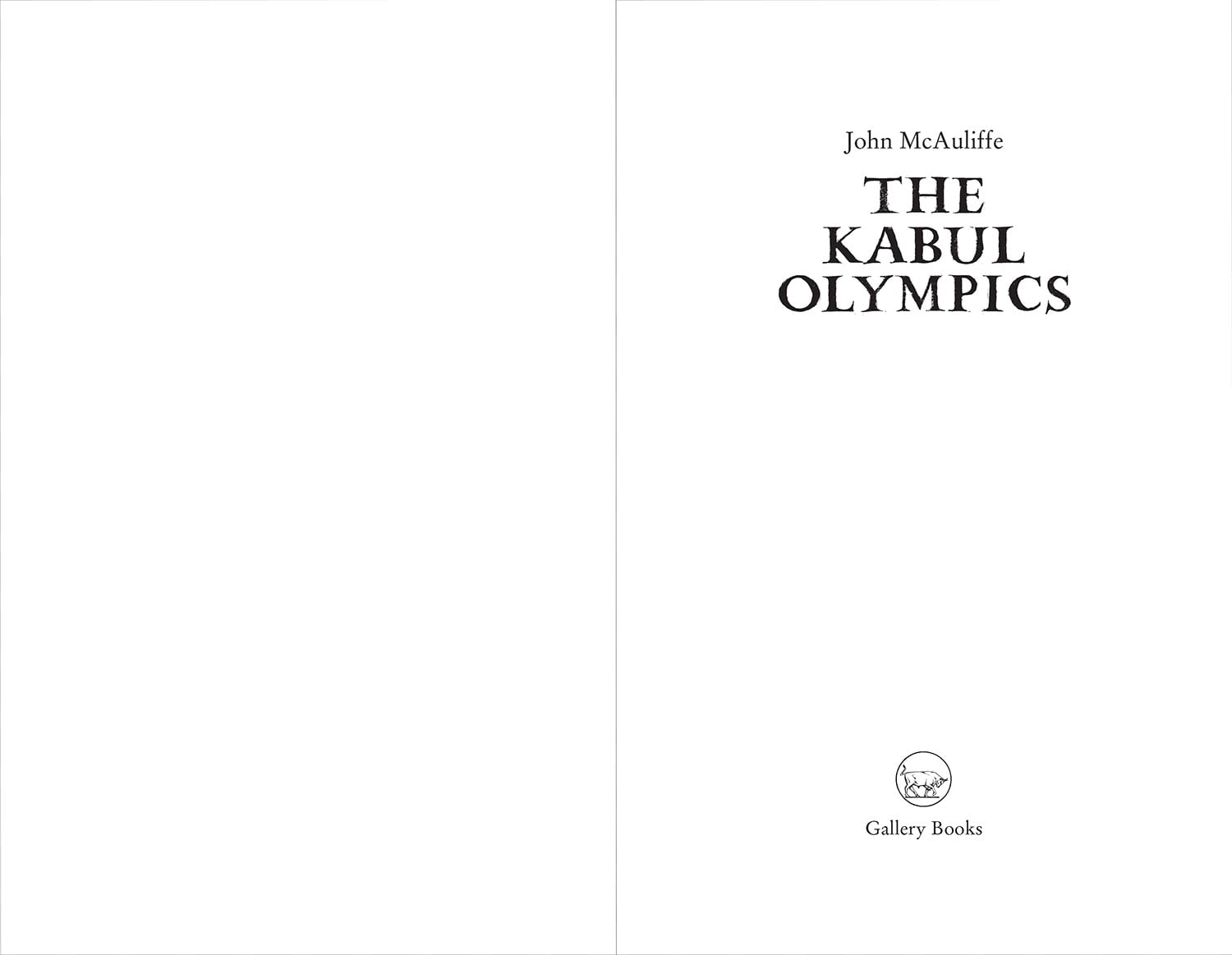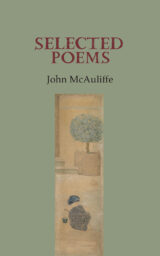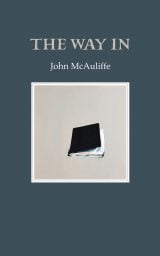The Kabul Olympics is a book of impossible places, from the imagined Kabul of the title poem to ‘City of Trees’ which conjures an alternate, parallel Manchester in the aftermath of the Arena bombing, from a plane spiralling ever upwards into the eye of a storm in ‘Godsend’ to the becalmed travels of ‘The Harbours’, a sequence which reflects on nationalism and border crossing. Many of these poems find themselves in the dark, on journeys whose destinations seem uncertain, an uncertainty to which the book grows accustomed, teasing out strands of inheritance and departures which take the poems offshore into the heart of political crises as well as returning to the household lyrics which John McAuliffe has made his own.
John McAuliffe's The Kabul Olympics is vivid poetry which pits individual lives and ordinary days and hours and minutes against the historical events and catastrophes which would blow them away.
'The range and variety of this collectionis considerable but McAuliffe is especially good — modest and amusing — on the home front. There is a wry poem about a losing battle against weeds, about failing to pitch a tent, and a charming poem about a par of vases, wedding presents. The poem starts as a still life bit is not altogether still. One vase gets broken, while its neglected twin is spotted on a shelf:
this remaining vase coolly at home up there where it had been forgotten,
a drink of air in its open mouth.
That last image is a good example of the clear wit of his style at best.' — Kate Kellaway, The Guardian, Poetry Book of the Month
Books of the Year 2020
Among Fallon’s pick of Irish poetry for 2020, I appreciated John McAuliffe’s The Kabul Olympics for its mix of astutely observed domesticity with danger zones, imagined territories and contested frontiers.
— Richard Davenport-Hines, Times Literary Supplement
______________________________________________________________
Great Upheavals, Small Triumphs
In “The Changing Mountain”, his recent essay on the mutable parameters of elegy (Poetry London Issue 96) Stephen Sexton notes “the imperceptible change a photograph, say, undergoes when someone depicted in it has died; how these images seem, somehow, utterly changed without having changed at all”. The same might be said for poems read during or subsequent to lockdown, given the way in which certain motifs have taken on a new or enhanced significance. John McAuliffe’s richly textured fifth collection from Gallery Press was published on April 2nd, and therefore completed before the pandemic manifested, yet many of the poems contained therein could be interpreted as referencing lockdown. McAuliffe’s work is often associated with domestic spaces, and a cluster of poems in the new collection could certainly be read as lockdown poems in the way that they are focused on gardens and interiors, with a wariness about what is going on elsewhere; a case in point is “Robin”, in which the suddenly sinister bird utters threats through the window while “silent and moving, tussling with something / on the lawn, something small, / for practice.”
A second thread which has particular resonance for a reader whose freedom has been curtailed is that of the intoxicating allure of journeys. Throughout the collection there is a metronomic tilt between stasis and “the idea of speed without purpose, / acceleration as an end in itself” (“A Minute to the Hour”). McAuliffe’s 2013 poem “Going Places” evoked potent childhood memories of “Sitting in the backseats of cars” and in this collection the poet, born and raised in Kerry, demonstrates the country teenager’s sense of the car as a symbol of freedom and escape. The sheer exhilaration of driving at speed runs through The Kabul Olympics, from the opening poem, “Germany”, in which “wheel-spinning through / black German forest, cities / a rumour you will not snatch at, / is to be content for once,” to “The Palm”, when the young poet and his schoolmates “stuck our heads out the windows, flung / ourselves at bends, shouted at commentary / we couldn’t hear, flying, it felt like, parking / as the ref added time for injury.”
The recurrent motif of cars expands its scope in the empathetic “Saloon”, in which the poet’s family car becomes an imaginative conduit to the unlikely hero of the Libyan rebellion, Mahdi Ziu, whose black Kia was used as a suicide vehicle to break into a base protecting pro-Gadhafi forces in 2011.
Explosions proliferate, not only in the context of war and terrorist attacks (the bombing of the Carcanet offices, the deaths of Francis Ledwidge and Mahdi Ziu, the Manchester Arena bombing, the “two tonnes of odourless Semtex” in the Eksund) but also as metaphor, as in the final poem, “Blown Way”, ostensibly about the difficulty of pegging down a tent. The fragment-like love lyric “Molecule” takes a different slant on the incendiary motif, ending with the line “At room temperature the look itself / the idea in a look is phosphor.”
In contrast to the speeding cars and detonations, the slow-mo paralysis of shock is exquisitely conveyed in “City of Trees”, which documents the aftermath of the terrorist attack on the Manchester Arena in 2017. CCTV images depict the perpetrator:
walking through the May weeks of the trees’
green explosions, the air
thick with willow pollen and honeysuckle,
all invisible in the greyscale’s pixel
rendering of the place, scrambling it
even as crowds gather elsewhere,
in shops and bars and streets, to shoot the breeze,
watch a match on telly, and follow their phones,
as I do, student of uprootings and aftermath,
hemmed in by the information
which descends on us like summer rain.
This is a carefully curated collection, in which the individual poems add up to more than the sum of their parts; for example “Ledwidge in Manchester”, which was shortlisted for the Listowel Writers’ Week Irish Poem of the Year in the 2017 Bord Gáis Energy Irish Book Awards, lends itself more readily to interpretation in the context of other poems about death and violent disruption in the city where McAuliffe lives and works.
Throughout is a sense of parallel worlds, the diurnal and its dark shade. Skilful layering is nowhere more evident than in the title poem, an elegy for the novelist Caroline Chisholm. This poem uses tercets to build a composite picture of the dedicatee by conjuring tales within tales within tales, one of which notes that Chisholm’s novel Swimming Pool Hill took its name from a hill where a Russian built a pool, “dreaming up an Olympics in Kabul, / before the rise of the Taliban”. In the context of the turmoil depicted elsewhere, the reference to the war-torn capital of Afghanistan takes on a broader significance. The cover image of the collection is Richard Mosse’s photograph “Foyer at Uday’s Palace”, depicting American soldiers at the home of Saddam Hussein’s son. Mosse has said of his photograph that he found “something sinister and circular about an occupying army lounging around a toppled dictator’s pool, in the area archaeologists call the ‘cradle of civilisation’.” (The Guardian, May 9th, 2012). It is a thought-provoking choice for a collection which honours the small and improbable triumphs of our daily lives against a backdrop of great upheavals.
— Amanda Bell, Dublin Review of Books
______________________________________________________________
Poetry Book of the Month – The Observer
Master of a small universe
This varied collection shows great sensitivity to language and detail but is at its witty best on domestic matters writes Kate Kellaway.
John McAuliffe is Irish but many of the poems in his sympathetic fifth collection are set in Manchester, where he teaches at university. One of the most involving of them is City of Trees, set on 22 May 2017 — the date gives you a clue to the content. It begins in the tone of a carefree journal, remembering a meeting at the town hall. From there, we briefly accompany the Irishman on a bicycle through Manchester, noting ‘the Curry Mile’s neon influence-/its last two Irish pubs, the Clarence/and the Whitworth refitted now as a Christian café/and a chrome-and-glass shisha bar’. What is striking about McAuliffe, in this poem and throughout the collection, is that he never over-edits life for the sake of poetry — he would cycle any distance, it seems, to avoid being loftily selective or unreliably sublime.
But one thing gives way to another and terror arrives without warning, turning up as suddenly in the poem as in life. Seeing the news of the arena bombings on television, he is alert to everything. The council leader is wearing ‘the same shirt/I’d seen him in twelve hours earlier’ and the mayor is promising “‘business as usual’ — a not exactly steely line”. But it is further on that the poem comes into its own as describes the footage of the bomber:
this watchful ex-student, born here, ill at ease,
walking through the May weeks of the trees’
slow green explosions, the air
thick with willow pollen and honeysuckle,
all invisible in the greyscale’s pixel
rendering of the place . . .
McAuliffe’s gift is to mindful of elsewhere. He swerves to effect: his shrewd sideways and backwards glances count, pouring light on a subject from several directions simultaneously. Any given moment is likely to be underpinned by what went on before or what is to come. He knows the power of parallel universes. The willow pollen and honeysuckle are barely seen but should not be overlooked. They are irrelevant and crucial.
The moving title poem is written in tribute to award-winning novelist Caroline Chisholm, who died of a brain tumour in her 40s. McAuliffe’s achievement is in making an afterlife for her.
The range and variety of this collection is considerable but McAuliffe is especially good — modest and amusing — on the home front. There is a wry poem about a losing battle against weeds, about failing to pitch a tent, and a charming poem about a par of vases, wedding presents. The poem starts as a still life bit is not altogether still. One vase gets broken, while its neglected twin is spotted on a shelf:
this remaining vase coolly at home up there where it had been forgotten,
a drink of air in its open mouth.
That last image is a good example of the clear wit of his style at best.
The Blackbird
The day’s white internal door
opens onto a kitchenful of what’s been before:
the kettle steaming up the radio; phone-chirps; clatter
of spoons; fridge hum; the order of things
surviving my wakeful night-time reckonings,
each hour hard to pin down as a handful of water,
each morning, each year echoing another I am slow to recognize,
and then, between the pips, there is
the air’s stillness into which a blackbird submits
the sweetest single high and overlaying sound a minute admits,
rising away as I slope
out of the morning to the end of its ropey, going hope,
a creature of its mid-air qualms,
its clustered notes and afterthoughts and here-I-ams.
It is hard to believe The Blackbird was not written during — and for — lockdown. And while I’m not sure I can visualize the ‘white internal door’, I appreciate the poem’s pleasing way of identifying the punctuation a blackbird brings to the repeated phrases of ordinary days.
— Kate Kellaway, The Observer
____________________________________________________________
Poetry round-up: A distinctive, uncanny door to history slides open
John McAuliffe’s poetry is often described as domestic but there is nothing tame about McAuliffe’s rooms where anything could happen:
Once (I am 9 or 10, acting as if there was no use
in my thinking she’s the centre of the world),
my mother left the kitchen with tap running
over a half dozen peeled eggs in the steel sink.
The water’s a blur. Has she gone up town for milk?
The eggs are white and grey. And then the car returning . . .
Clippings is one of two poems in The Kabul Olympics (Gallery Press, €11.95) about McAuliffe’s deeply influential mother: “She is with me at the kitchen table,/between the fridge and the front door:/both sea and salt, error and adventure.” This collection, soaked in “sea and salt”, builds on the unsettling voyages of The Way In (Gallery 2015).
A magnificent central sequence, The Harbour, references The Tempest and Aenied, telling 20th century tales of arms and the man along the Kerry coastline, well suited to McAuliffe’s sensibility which is both rapt Miranda and world-weary Prospero. The Coast of Nowhere wonders if its own title means “To be/ here and nowhere at all”, echoing Bernard O’Donoghue’s dilemma of the emigrant.
Manchester is a central character here, its rooms and streets luminous, often ominous under the intensity of McAuliffe’s gaze. The Manchester Arena bombing is the incendiary centre in City of Trees, tree pollen erupting in “slow green explosions”. Prophetic uncertainty shivers right through this subtly linked seamless collection, building to the final Blown Away, a mere tent which the narrator failed to secure.
But nothing is too insignificant for McAuliffe’s egalitarian, watchful eye: not even the elastic band “in two parts” (as “miraculous” as his mother’s American Maple) which survived the 1996 bombing of Carcanet’s offices in Manchester:
. . . ash and a smudged print
on the sheet when I move it a little,
a dry scent in the air
as I put everything back . . .
including the two pieces of elastic
which still hold all this paper together.
— Martina Evans, The Irish Times
Year Published: 2020
Details: 72pp
ISBN PBK: 978 1 91133 784 3
ISBN HBK: 978 1 91133 785 0
Cover: ‘Foyer at Uday’s Palace’ (2009) © Richard Mosse





